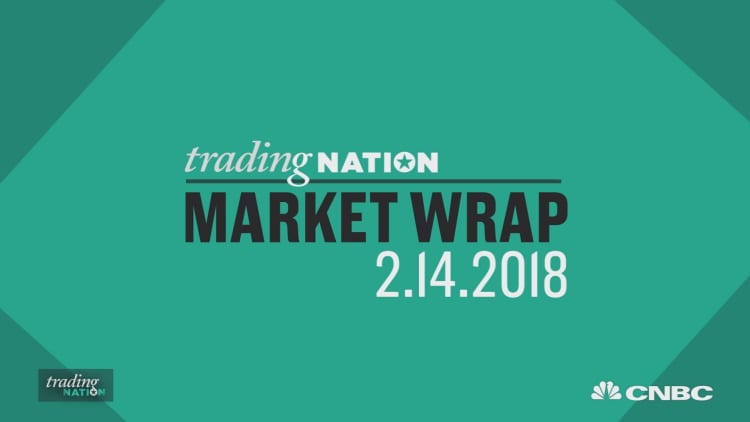
Stocks rose sharply on Wednesday, notching a four-day winning streak as banks and tech carried major indexes higher. They rose despite a jump in bond yields.
The Dow Jones industrial average closed 253.04 points higher at 24,893.49 after falling as much as 150 points. Goldman Sachs contributed the most to the gains, rising 2.8 percent. The 30-stock index also erased all of its 2018 losses and posted its longest winning streak since Jan. 5.
The gained 1.3 percent to 2,698.63, with financials and tech each rising more than 1.5 percent. Bank of America, J.P. Morgan Chase, Citigroup and Morgan Stanley all traded higher. The financials sector had its best day since Nov. 28. The index also turned positive for 2018.
The Nasdaq composite advanced 1.9 percent to close at 7,143.62, as shares of Facebook, Amazon, Netflix and Alphabet rose.
"It almost looks like the market is realizing the economy is still doing well," said Ryan Detrick, senior market strategist at LPL Financial. He noted however, the market is "still in the process of carving off a bottom. ... There's going to be more volatility ahead."
U.S. equities opened lower on the back of stronger-than-expected inflation data. The consumer price index rose 0.5 percent in January. Economists polled by Reuters expected a gain of 0.3 percent. Investors also digested weaker-than-expected retail sales for last month.
"You got the worst-case scenario with this economic data," said Art Hogan, chief market strategist at B. Riley FBR. "You got a hotter-than-expected CPI number and weaker retail sales. Unfortunately, CPI gets much more focus than normal because of the wage growth number we saw" in the last jobs report.
The 10-year note yield spiked higher following the data release and hit a four-year high above 2.91 percent.
But Bill Northey, senior vice president at U.S. Bank Wealth Management, said: "This isn't, in our view, problematic inflation, but rather a side effect" of current economic conditions. He noted that corporate earnings are strong and the U.S. economy is accelerating.
Concerns of rising inflation have recently sent jitters down Wall Street. Last week, all three major U.S. indexes finished the five-day trading period more than 5 percent down each, with the Dow delivering its worst performance since January 2016.
Those jitters also helped kick off a fresh bout of market volatility. In its previous eight sessions, the Dow has posted six triple-digit moves and two of those are 1,000-point losses.
In that time, the Cboe Volatility index (VIX) briefly broke above 50, but traded back below 20 for the first time since the sell-off on Wednesday.
The SPDR S&P Bank exchange-traded fund (KBE), rose 2.9 percent and posted its best day since Nov. 29.



